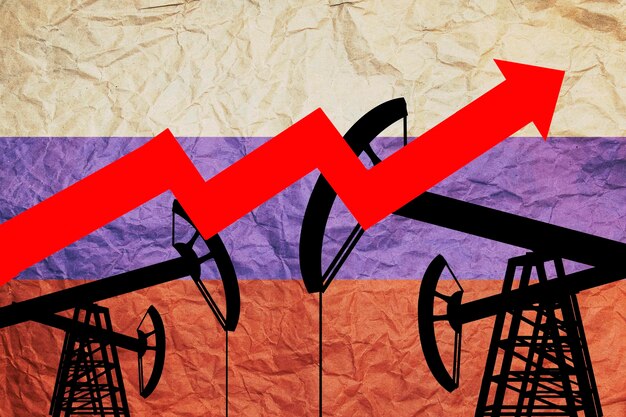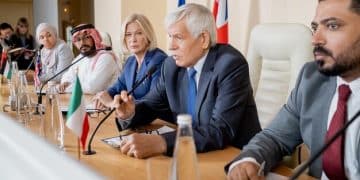Analyzing sanctions’ effects on US foreign policy objectives

The latest round of sanctions on Russia significantly impacts US foreign policy objectives by recalibrating geopolitical alignments, influencing global energy markets, and challenging the efficacy of economic coercion as a primary diplomatic tool.
In the complex theater of international relations, understanding the full impact of economic measures is crucial. Analyzing the Effects of the Latest Round of Sanctions on Russia on US Foreign Policy Objectives reveals a multi-faceted narrative, where intended outcomes often intertwine with unforeseen consequences, reshaping the global chessboard.
The Geopolitical Landscape and Sanction Design
The geopolitical landscape underpinning the latest sanctions imposed on Russia is remarkably complex, marked by a dynamic interplay of power, deterrence, and strategic competition. The United States, alongside its allies, meticulously crafted these measures to exert significant pressure on Russia’s economy, aiming to alter its foreign policy calculus, particularly concerning its actions in Ukraine. Yet, the design of these sanctions extends beyond mere economic pain; it seeks to achieve specific political objectives.
These objectives include deterring further aggression, undermining Russia’s capacity to finance military operations, and fostering a return to international law. However, the execution of such a broad-reaching economic strategy inherently involves balancing short-term impacts with long-term strategic reverberations. This balance significantly complicates an already intricate international environment, where every action elicits a reaction.
Targeting Key Sectors and Strategic Ambiguity
The sanctions’ architects focused on critical sectors of the Russian economy, including finance, energy, and technology. The intent was to cripple Russia’s ability to operate financially on the global stage and to degrade its industrial and military capabilities. However, strategic ambiguity often accompanies such targeted measures, leaving room for interpretation and adaptation by the sanctioned entity. This ambiguity can sometimes dilute the immediate punitive impact and open avenues for circumvention.
- Financial Institutions: Restrictions on major Russian banks, including exclusion from SWIFT, aimed to isolate Russia from global financial flows, complicating trade and investment.
- Energy Sector: While energy exports are Russia’s lifeblood, sanctions aimed to reduce future investment in production and disrupt the flow of oil and gas revenue, albeit with careful considerations to avoid global energy market destabilization.
- Technology & Dual-Use Goods: Export controls on advanced technologies sought to degrade Russia’s military-industrial complex and its capacity for innovation, limiting access to essential components for defense and other advanced industries.
The efficacy of these measures hinges not just on their breadth but also on the collective resolve of the sanctioning nations. Any deviation or loopholes can significantly undermine their intended effect. The careful calibration of these sanctions reflects a nuanced understanding that while economic pressure is a powerful tool, it is not without its own set of potential backlashes, particularly concerning global economic stability and humanitarian implications.
Ultimately, the design of these sanctions reveals a calculated gamble by the United States and its allies. The hope is that through sustained economic pressure, Russia will be compelled to reassess its foreign policy decisions. However, the exact political outcomes remain uncertain, as economic hardship can sometimes lead to increased defiance rather than compliance, posing an ongoing challenge for US foreign policy objectives.
Economic Repercussions and Global Market Stability
The latest rounds of sanctions on Russia have unleashed a cascade of economic repercussions that extend far beyond its borders, significantly impacting global market stability. These measures, designed to financially isolate and weaken Russia, inevitably ripple through interconnected international economies, creating both expected and unforeseen challenges for the United States and its allies. The objective is to apply significant pressure without triggering a broader economic crisis, a delicate balancing act.
The immediate effects were seen in the volatility of energy markets, given Russia’s role as a major oil and gas exporter. While the US and European allies sought to reduce reliance on Russian energy, the transition is neither swift nor seamless, leading to price surges that contribute to global inflation. This inflation, in turn, can erode public support for continued sanctions, posing a domestic political challenge for Washington.
Impact on Energy Markets and Supply Chains
The sanctions’ direct and indirect influences on energy markets have been profound. Reducing the flow of Russian oil and gas, whether through direct bans or self-imposed buyer restrictions, has fundamentally altered supply-demand dynamics. This has pushed energy prices upwards globally, affecting consumers and industries alike. For the US, managing these energy price increases is crucial for maintaining economic stability and public morale.
- Oil Prices: Sanctions and the threat of future actions contribute to sustained high oil prices, impacting transportation, manufacturing, and consumer spending worldwide. This has necessitated strategic oil releases from reserves by the US.
- Natural Gas Supply: Europe’s heavy reliance on Russian natural gas has driven efforts to find alternative sources, but this transition is costly and time-consuming, creating energy security concerns that also indirectly affect US policy.
- Supply Chain Disruptions: Beyond energy, sanctions have exacerbated existing supply chain issues, particularly for commodities like wheat, fertilizers, and certain metals where Russia is a key producer. These disruptions affect global food security and manufacturing, creating inflationary pressures.
Furthermore, the financial sanctions, including the exclusion of certain Russian banks from SWIFT, have complicated international trade and financial transactions. This has prompted some countries to explore alternative payment systems, potentially fragmenting the global financial architecture. While aiming to isolate Russia, such fragmentation could, in the long term, diminish the dominance of US dollar-based transactions, which presents a strategic concern for US economic leverage.
In essence, while the sanctions are potent tools, their application demands constant vigilance and adaptation. The economic repercussions are broad and multifaceted, requiring the US to navigate carefully to achieve its foreign policy objectives without inadvertently destabilizing global markets or alienating key partners facing the brunt of these economic shifts.

Diplomatic Realignments and Alliance Cohesion
The latest round of sanctions on Russia has undeniably triggered significant diplomatic realignments, testing the cohesion of existing alliances and prompting new strategic partnerships. For the United States, a core objective of these sanctions was to solidify a united front against Russian aggression, demonstrating collective resolve and reinforcing the principles of international law. The success of this objective heavily relies on maintaining the unity and commitment of key allies, which presents an ongoing diplomatic challenge.
Initially, there was a remarkable display of unity among NATO members and G7 nations in imposing these stringent measures. This collective action underscored a shared condemnation of Russia’s actions and a commitment to uphold the post-Cold War security order. However, as the economic costs of sanctions begin to accrue, particularly for energy-dependent European nations, maintaining this seamless cohesion requires continuous diplomatic engagement and burden-sharing.
Navigating Divergent National Interests
Despite the broad consensus, national interests among allies are not always perfectly aligned. Countries with closer economic ties to Russia or more immediate energy vulnerabilities may face greater domestic pressure to seek exemptions or alternative arrangements. The US foreign policy apparatus must deftly navigate these divergent interests, ensuring that the integrity and impact of the sanctions regime are not diluted.
- European Energy Reliance: European nations, particularly Germany and Italy, grapple with reducing their dependence on Russian energy while avoiding economic recession. This requires delicate negotiations and diversification efforts, which the US supports.
- Global South Diplomacy: Many countries in the Global South have remained neutral or critical of the sanctions, prioritizing their own economic stability and non-alignment. Engaging these nations and countering Russian narratives requires a nuanced diplomatic approach from the US.
- China’s Stance: China’s continued economic engagement with Russia, albeit cautious, complicates the broader aim of international isolation. The US seeks to deter large-scale Chinese assistance to Russia without provoking an open economic confrontation with Beijing.
Moreover, the sanctions have prompted Russia to seek closer alliances with countries outside the traditional Western sphere, notably China and India. This pivot eastward could diminish the effectiveness of Western isolation efforts in the long run, leading to a more bifurcated global economic system. For US foreign policy, this necessitates a proactive strategy to strengthen existing partnerships and build new bridges, reinforcing the liberal international order.
Ultimately, the success of the sanctions in advancing US foreign policy objectives is not solely determined by their economic bite but also by their capacity to sustain and strengthen the diplomatic coalition upholding them. This requires constant dialogue, strategic compromise, and a shared understanding of the long-term geopolitical stakes.
Impact on US-Russia Relations and Deterrence
The latest round of sanctions has profoundly reshaped the foundational dynamics of US-Russia relations, pushing them to their lowest point in decades. While the primary objective of these sanctions is to deter Russian aggression and influence its behavior, they inherently solidify an adversarial posture between the two nuclear powers. This recalibration affects not only immediate diplomatic interactions but also long-term strategic stability, making deterrence a critical but complex objective for US foreign policy.
The sanctions are a clear manifestation of US resolve, signaling that direct military intervention is off the table but severe economic consequences are not. However, the very act of imposing such comprehensive measures reduces the space for conventional diplomacy and dialogue with Moscow. Communication channels become strained, and the mechanisms for de-escalation or conflict resolution become more tenuous, increasing the risk of miscalculation.
Deterrence Theories in Practice
The application of sanctions as a deterrent is rooted in various theories of coercive diplomacy. The hope is to raise the costs of aggression to a level where the target state finds further hostile actions economically unbearable. However, the effectiveness of this deterrence depends on Russia’s perception of both the severity of the sanctions and the US’s sustained commitment to them.
- Punishment Deterrence: Sanctions aim to inflict pain, punishing past actions and projecting future consequences if aggression continues. This seeks to change Russia’s cost-benefit analysis.
- Denial Deterrence: By limiting Russia’s access to critical technologies and financial resources, sanctions also aim to degrade its capacity to wage war effectively, denying it the means to achieve military objectives.
- Credibility Gap: A central challenge for deterrence is maintaining credibility. If sanctions are perceived as ineffective or temporary, their deterrent value diminishes, potentially emboldening the target state.
Furthermore, the sanctions have cultivated a siege mentality within Russia, potentially leading to increased autarky and a consolidation of power. This internal dynamic can make the Russian leadership more resistant to external pressure, viewing the sanctions as an assault on national sovereignty rather than a response to specific actions. This makes the US objective of influencing Russian behavior through economic means far more challenging, as the regime may prioritize political survival over economic well-being.
Therefore, while the sanctions unequivocally signal US disapproval and impose significant costs, their long-term impact on direct US-Russia relations and the effectiveness of deterrence remains a subject of ongoing analysis. The current trajectory suggests a prolonged period of strained relations, demanding innovative diplomatic strategies beyond economic coercion to manage the risks inherent in great power competition.
Humanitarian and Unintended Consequences
While the primary aim of sanctions is to exert political and economic pressure, they frequently carry significant humanitarian and unintended consequences that cannot be overlooked when analyzing their impact on US foreign policy objectives. These effects can complicate aid efforts, exacerbate existing vulnerabilities, and sometimes even undermine the very moral authority wielded by the sanctioning nations.
The latest sanctions on Russia, while carefully designed to target specific sectors, have nevertheless affected ordinary citizens. Disruptions to financial systems can impede the delivery of humanitarian aid, complicate remittances, and limit access to essential goods, particularly for vulnerable populations. This reality necessitates a careful assessment of how to mitigate such impacts while maintaining pressure on the targeted regime.
Economic Fallout and Civilian Hardship
The economic fallout from sanctions can translate directly into civilian hardship, even if not intentionally. Inflation, scarcity of imported goods, and job losses can degrade living standards and create social unrest. This unintended suffering can sometimes be exploited by the sanctioned regime to rally domestic support against the “external aggressors.”
- Price Increases: Sanctions contribute indirectly to rising prices for essential goods within Russia, affecting purchasing power for average citizens.
- Medical Supply Access: While typically exempt, the complexities of financial transactions and logistics can sometimes impede the delivery of critical medical supplies and equipment, creating health crises.
- Brain Drain: Economic hardship and lack of opportunity can accelerate the emigration of skilled professionals and youth, leading to a long-term decline in human capital, an unintended consequence for both the sanctioned nation and regional stability.
Moreover, sanctions can inadvertently incentivize illicit trade and dark networks as a means of circumvention. This can empower actors outside the legitimate economic system, potentially fostering corruption and complicating future enforcement efforts. For US foreign policy, this means sanctions, while powerful, must be part of a broader strategy that includes humanitarian considerations, robust diplomatic engagement, and clear pathways for de-escalation if desired changes in behavior occur.
Acknowledging and addressing these unintended consequences is crucial for the long-term credibility and effectiveness of sanctions as a foreign policy tool. It requires continuous monitoring, adaptive policies, and a willingness to provide humanitarian exemptions and support where feasible, ensuring that the burden does not fall disproportionately on innocent populations.
Future Trajectories and US Strategic Adaptations
The latest round of sanctions on Russia has set in motion future trajectories in international relations that will require significant adaptations from US strategic policy. The current sanctions regime is not a static measure but a dynamic process, necessitating continuous evaluation and adjustment to remain effective and aligned with evolving US foreign policy objectives. The long-term implications for global economic order, geopolitical alliances, and the future of great power competition are immense.
One key trajectory involves the potential for a more fragmented global economy, with growing de-dollarization efforts by nations seeking to circumvent US financial leverage. While not an immediate threat, this trend could, over time, erode the dominance of the US dollar, which has been a cornerstone of American economic and geopolitical power. This requires the US to explore new avenues for economic influence and reinforce the attractiveness of its financial system.
Innovating Sanctions and Diplomatic Tools
As sanctioned nations develop strategies for circumvention, the US must continually innovate its sanctions approach, ensuring they remain effective without causing undue harm to allied economies or unintended civilian suffering. This could involve more targeted sanctions, leveraging technological advancements for better enforcement, and enhancing multilateral coordination.
- Technological Sanctions: Future sanctions may increasingly leverage sophisticated technology to track financial flows and identify illicit networks, making circumvention more difficult.
- Adaptive Enforcement: The US will need to adapt its enforcement mechanisms to prevent a ‘shadow economy’ from growing, which undermines sanction effectiveness and empowers illicit actors.
- Multi-Stakeholder Engagement: Beyond traditional state actors, future foreign policy will increasingly require engaging with private sector entities, NGOs, and international organizations to maximize impact and mitigate unintended consequences.
Another crucial adaptation involves strengthening alliances and building new coalitions. The sanctions have underscored the importance of collective action, but future challenges will demand even broader cooperation to address complex global issues, from climate change to cybersecurity. US foreign policy objectives will increasingly depend on its ability to convene and lead diverse groups of nations, even those with differing short-term interests.
Furthermore, the US must prepare for a prolonged period of adversarial relations with Russia, even as it looks for pragmatic pathways to manage competition and prevent escalation. This entails investing in diplomatic capacity, fostering arms control dialogues, and maintaining robust defense capabilities. The future trajectory suggests a world of enhanced multipolarity, where economic coercion remains a potent, yet perpetually evolving, tool in the grand strategy of nations.

| Key Point | Brief Description |
|---|---|
| 🌍 Geopolitical Shift | Sanctions reshape global power dynamics, fostering new alliances and challenging existing ones. |
| 💸 Economic Impact | Significant effects on Russian economy, with global ripples in energy and supply chains. |
| 🤝 Alliance Cohesion | Tests unity among allies, requiring continuous diplomatic effort to maintain a united front. |
| 🛡️ Deterrence vs. Dialogue | Sanctions aim to deter but complicate direct US-Russia engagement, increasing risk of miscalculation. |
Frequently Asked Questions
Sanctions targeting Russia, a major energy exporter, lead to supply disruptions and price volatility in global oil and gas markets. This often results in higher energy costs for consumers and industries worldwide, prompting countries to seek alternative energy sources and diversify their supply chains to reduce reliance on Russian exports.
The effectiveness of sanctions as a deterrent is a complex and highly debated topic. While they impose significant economic costs on Russia and aim to limit its capacity for aggression, their ability to directly change Russian foreign policy behavior is not always immediate or guaranteed. Deterrence often depends on sustained pressure and clear objectives set by the sanctioning nations.
Key US foreign policy objectives influenced by sanctions include deterring further Russian aggression, undermining its military capabilities, isolating Russia financially and diplomatically, strengthening alliances, and upholding international norms. The sanctions aim to recalibrate Russia’s strategic calculus while reinforcing the liberal international order, though outcomes vary.
Sanctions typically exacerbate tensions in US-Russia diplomatic relations, often leading to a reduction in formal dialogue channels and an increase in rhetorical confrontation. While they signal strong disapproval, they can also solidify adversarial postures, making it harder to find common ground on other global issues or manage potential escalations effectively through traditional diplomacy.
Yes, unintended humanitarian consequences are a significant concern with broad sanctions. While often designed with exemptions for essential goods, financial restrictions can disrupt supply chains, contribute to inflation, and limit access to medical supplies or food for ordinary citizens. This necessitates careful monitoring and adaptive policies to mitigate adverse impacts on vulnerable populations.
Conclusion
The latest rounds of sanctions on Russia represent a powerful, multifaceted instrument of US foreign policy, wielded with the intent of altering geopolitical trajectories and upholding international norms. While they have undeniably inflicted significant economic costs on Russia and fostered a degree of allied cohesion, their comprehensive analysis reveals a spectrum of intended and unintended consequences. From reshaping global energy markets and challenging alliance solidarity to complicating the very nature of US-Russia relations, these measures demand continuous strategic adaptation. Moving forward, the efficacy of sanctions as a tool of coercion will hinge not only on their economic bite but also on the agility of US diplomacy to navigate a complex, increasingly multipolar world, ensuring that objectives are met while mitigating broader instability and humanitarian concerns.





